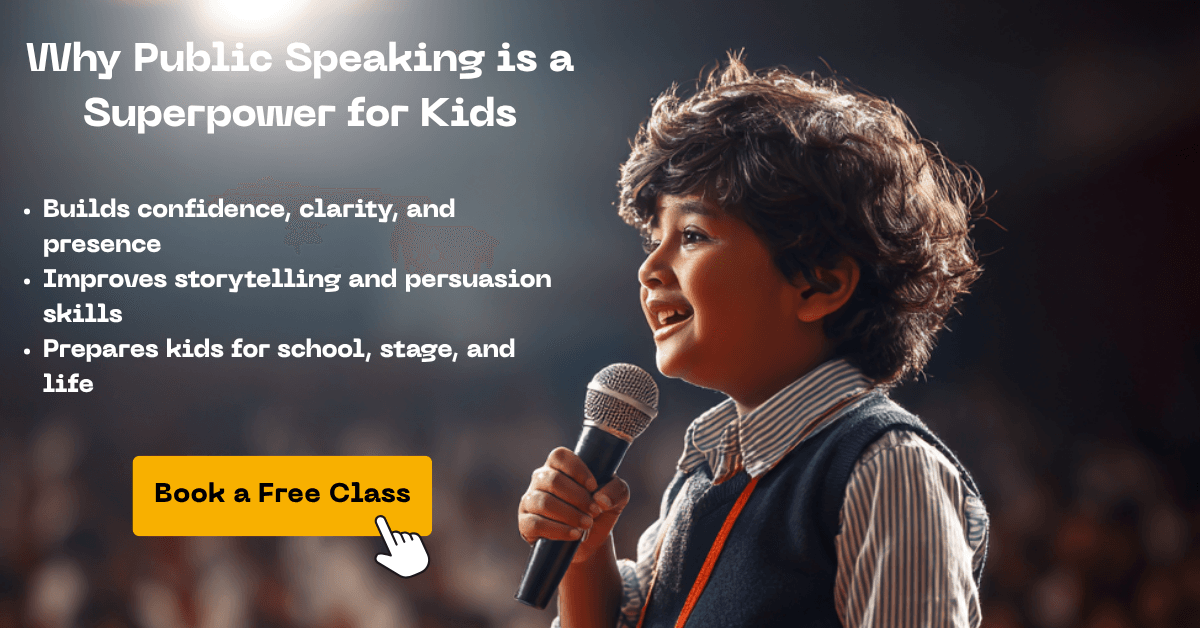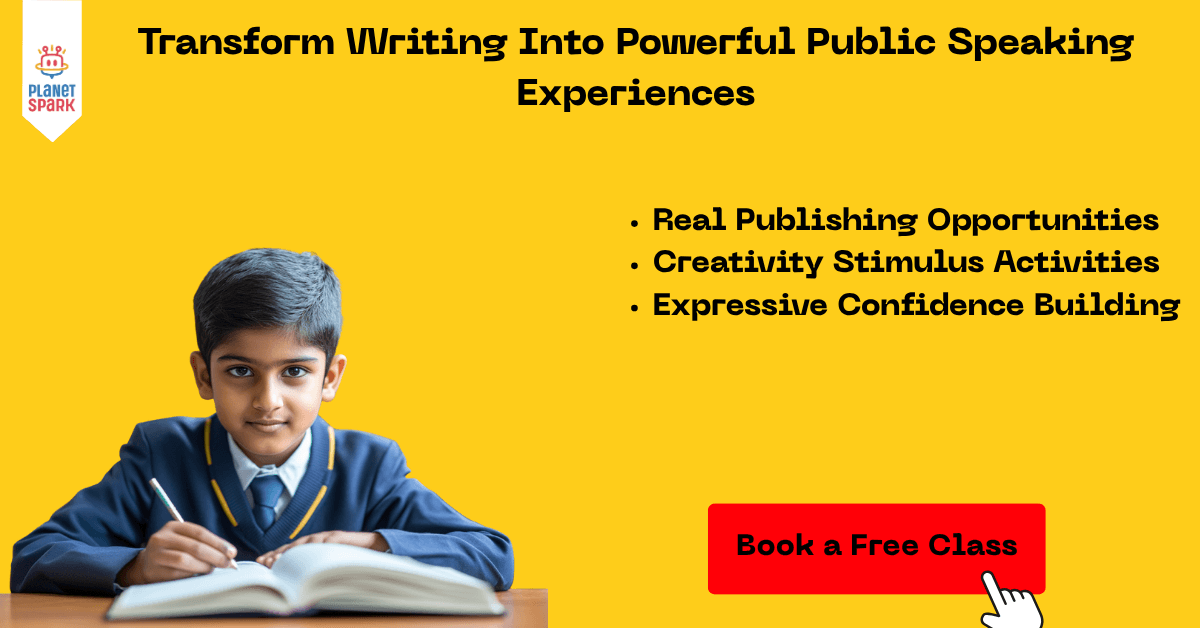How Reading Books Improves Observation Skills for Public Speaking

Table of Contents
- How Reading Books Sharpens Observational Skills for Public S
- What Is Observation and Why It Matters in Public Speaking
- The Link Between Observation Skills and Public Speaking Succ
- Observation Meaning Beyond Words: Understanding Audience Dyn
- Books as Tools to Strengthen Cognitive and Communication Ski
- Observations and Personal Growth through Reading
- How Reading Books Builds Strong Public Speaking Skills in St
- Why Choose PlanetSpark to Enhance Your Public Speaking and O
In today’s world, effective public speaking is a critical skill that sets individuals apart. One of the most powerful tools to improve speaking abilities is reading. Reading books enhances observational skills, builds vocabulary, improves comprehension, and nurtures confidence. This blog explores how regular reading strengthens observation, sharpens focus, and equips you to communicate ideas clearly and persuasively. You’ll also learn how reading connects observation with public speaking, helping you become a more impactful and confident speaker.
How Reading Books Sharpens Observational Skills for Public Speaking
Reading books is like a mental rehearsal for public speaking. Every page trains you to notice details, emotions, and subtle patterns in characters, stories, and arguments, key skills for understanding your audience. Strong observational skills allow speakers to read a room, gauge reactions, and adjust tone and pace effectively.
When you immerse yourself in a variety of books, fiction, non-fiction, and biographies, you develop the ability to interpret body language, emotions, and intent. This translates directly into speaking scenarios where understanding your listeners’ responses is vital. Reading doesn’t just improve intellect; it builds emotional intelligence, empathy, and awareness, qualities that form the backbone of persuasive, engaging public speakers.

What Is Observation and Why It Matters in Public Speaking
Before mastering public speaking, it’s essential to understand what observation really means. Observation isn’t just seeing; it’s about perceiving with intent and awareness. For a speaker, this skill is invaluable noticing the audience’s mood, reactions, or attention span helps adjust your speech dynamically.
Reading strengthens this ability by training your brain to notice nuances in language, emotion, and context. Observant readers become speakers who can connect better with their audience, anticipate questions, and respond thoughtfully. In short, cultivating a habit of reading enhances observation skills, which form the foundation for confident, impactful public speaking.
The Link Between Observation Skills and Public Speaking Success
Effective speakers are keen observers. Through reading, you train your mind to notice tone, subtle cues, context, and implied meanings. These skills not only enhance reading comprehension but also strengthen your ability to present ideas convincingly. By paying attention to the nuances in language, emotion, and behavior, you develop the awareness necessary to adapt your message to any audience.
For example, reading and analyzing books helps speakers in several ways:
• Understanding human behavior – Examining a character’s choices, reactions, and motivations teaches empathy and perspective, essential for connecting with diverse audiences.
• Strengthening logical reasoning – Non-fiction and factual texts improve analytical skills, helping you structure speeches with clarity and coherence.
• Expanding vocabulary – Exposure to varied language and writing styles equips you to communicate more effectively and persuasively.
• Anticipating audience reactions – Observations from reading train you to recognize cues and subtle feedback, allowing you to adjust your tone, pace, and emphasis for maximum engagement.
• Boosting confidence in delivery – A well-read speaker feels more prepared, knowledgeable, and comfortable sharing insights in front of others.
By cultivating these skills through regular reading, you not only enhance your observational skills but also transform your public speaking into a compelling and impactful experience.
Master the art of audience observation!
Join PlanetSpark and build your public speaking skills through experiential learning.
Observation Meaning Beyond Words: Understanding Audience Dynamics
The observation meaning extends beyond noticing words or actions; it’s about interpreting intent, emotion, and context. In public speaking, understanding these subtle dynamics can transform a good speech into a memorable one.
Books, especially biographies and real-life stories, provide insight into human behavior, decision-making, and communication styles. By observing and reflecting on these examples, readers develop the ability to engage, persuade, and inspire others. This skill enhances self-awareness and audience awareness, forming the cornerstone of effective public speaking.
Books as Tools to Strengthen Cognitive and Communication Skills
Scientific studies show that reading stimulates multiple regions of the brain simultaneously, including areas responsible for comprehension, memory, critical thinking, and visualization. These cognitive benefits are crucial for public speaking, where you need to recall information quickly, organize your thoughts clearly, and express ideas confidently. By exercising these mental faculties through reading, speakers are better prepared to deliver structured, persuasive, and engaging presentations.
Diverse reading also enhances cognitive flexibility, enabling speakers to adapt seamlessly to unexpected questions, debates, or interruptions. Different genres provide unique advantages:
• Fiction – Strengthens emotional intelligence by helping you understand characters’ motivations, emotions, and perspectives, improving empathy and audience connection.
• Non-fiction – Sharpens logical reasoning and analytical skills, helping you build structured arguments and communicate complex ideas clearly.
• Historical texts and biographies – Enhance critical thinking by presenting real-world patterns, decision-making processes, and problem-solving strategies, which can be applied to speech content and delivery.
• Poetry and creative literature – Improves language richness, rhythm, and expression, adding flair and confidence to spoken presentations.
By reading widely, you train your mind not only to observe and interpret but also to communicate effectively, anticipate audience reactions, and respond thoughtfully. This combination of mental agility and emotional awareness is the cornerstone of strong, confident, and persuasive public speaking.
Observations and Personal Growth through Reading
Regular reading helps speakers make sharper observations about people, situations, and ideas. Observant individuals can read audience cues, understand unspoken reactions, and tailor their speeches for maximum engagement.
Reading also improves patience, focus, and reflective thinking, vital traits for confident speakers. These skills allow speakers to craft thoughtful, structured, and persuasive messages while maintaining a calm and composed presence. Essentially, the habit of observation cultivated through reading equips aspiring speakers with the awareness and confidence needed to connect meaningfully with any audience.
Transform your reading into public speaking excellence!
How Reading Books Builds Strong Public Speaking Skills in Students
For students, reading isn’t just an academic exercise; it forms the foundation for effective communication and public speaking mastery. By engaging with texts attentively, students train their minds to observe ideas, themes, and arguments closely, which strengthens critical thinking, vocabulary, and articulation. These skills translate directly into confident public speaking, allowing students to:
• Express ideas clearly – Organize thoughts logically and present arguments in a coherent, persuasive manner.
• Speak confidently – Develop self-assurance through knowledge and preparation, reducing anxiety during presentations.
• Engage audiences effectively – Use rich vocabulary and appropriate expressions to hold listeners’ attention.
Reading also cultivates keen observation skills, which are essential for interactive speaking scenarios. Students who observe can:
• Listen actively – Understand others’ viewpoints during discussions, debates, and group activities.
• Respond thoughtfully – Tailor their message based on audience reactions, body language, and feedback.
• Develop empathy and perspective-taking – Recognize diverse experiences and adapt communication to connect meaningfully with different audiences.
• Anticipate audience needs – Adjust tone, pacing, and examples to maximize clarity and impact.
By reflecting on narratives, real-life stories, and character experiences, students not only enhance their speaking skills but also cultivate emotional intelligence, self-awareness, and social perceptiveness, all of which are hallmarks of impactful public speakers. In essence, regular reading equips students to navigate academic, social, and professional environments confidently, turning observation into a key tool for communication excellence.

Reading books is far more than a way to gain knowledge; it is a transformative exercise that shapes confident, articulate, and perceptive speakers. Every page enhances observational skills, helping you notice subtleties in language, behavior, and context that are crucial for effective public speaking. By training your mind to analyze, empathize, and interpret, reading equips you to engage audiences thoughtfully, respond to cues, and communicate with clarity and impact.
Moreover, reading nurtures emotional intelligence, focus, and reflective thinking, enabling speakers to connect meaningfully with listeners and adapt to any environment. Whether it’s understanding human behavior, anticipating questions, or delivering a compelling narrative, the insights gained through reading lay the groundwork for powerful communication and personal growth. By cultivating these observation and speaking skills, students and professionals alike can build a confident, persuasive, and well-rounded personality capable of navigating life’s challenges with poise and clarity.
Why Choose PlanetSpark to Enhance Your Public Speaking and Observation Skills?
Comprehensive Development Beyond Academics
Our programs focus on communication, goal-setting, self-introduction, peer collaboration, and leadership, ensuring holistic personality growth alongside public speaking skills.Social-Emotional Learning at the Core
PlanetSpark’s curriculum is based on SEL principles, cultivating empathy, emotional intelligence, and interpersonal awareness.Practical, Hands-On Learning
Mock interviews, public speaking exercises, journaling, and real-life scenario simulations turn knowledge into practical skills and confidence.Leadership and Presentation Skills
Students learn responsibility, assertiveness, teamwork, and empathy through interactive challenges, shaping well-rounded communicators.Continuous Progress Tracking
Regular parent consultations monitor growth in confidence, openness, and leadership, ensuring personalized development.Etiquette and Body Language Mastery
From posture and eye contact to respectful communication and voice modulation, students refine their presence and self-expression.
Frequently Asked Questions
Reading books encourages attention to detail, visualization, and analysis. By noticing subtle cues in stories, characters, and ideas, readers strengthen their observational skills, which they can apply in real-life situations.
Observation is the conscious act of noticing details, patterns, and behaviors to derive insights. In learning, observation helps readers understand concepts deeply, improve comprehension, and develop critical thinking abilities.
Understanding the meaning of observation helps students recognize its role in learning and personal growth. Observant students can analyze information, interpret situations accurately, and respond thoughtfully in both academic and social contexts.
Yes, reading requires sustained attention and concentration. As readers engage with text, they learn to focus on details, follow storylines, and retain information, which enhances overall attention span and cognitive alertness.
Books mirror real-life experiences and human behavior. By observing characters’ actions, motivations, and consequences, readers develop empathy, decision-making ability, and problem-solving skills applicable in daily life.
Personalized Communication Report
Record a video to get a AI generated personalized communication report for your child

Hi There, want to try these
tips for your child with
LIVE with our expert coach?
Let's check your child's
English fluency
